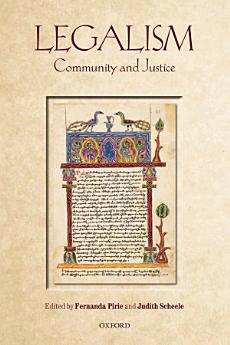Legalism: Community and Justice
Fernanda Pirie · Judith Scheele
gush 2014 · OUP Oxford
Libër elektronik
260
Faqe
family_home
I përshtatshëm
info
reportVlerësimet dhe komentet nuk janë të verifikuara Mëso më shumë
Rreth këtij libri elektronik
'Community' and 'justice' recur in anthropological, historical, and legal scholarship, yet as concepts they are notoriously slippery. Historians and lawyers look to anthropologists as 'community specialists', but anthropologists often avoid the concept through circumlocution: although much used (and abused) by historians, legal thinkers, and political philosophers, the term remains strikingly indeterminate and often morally overdetermined. 'Justice', meanwhile, is elusive, alternately invoked as the goal of contemporary political theorizing, and wrapped in obscure philosophical controversy. A conceptual knot emerges in much legal and political thought between law, justice, and community, but theories abound, without any agreement over concepts. The contributors to this volume use empirical case studies to unpick threads of this knot. Local codes from Anglo-Saxon England, north Africa, and medieval Armenia indicate disjunctions between community boundaries and the subjects of local rules and categories; processes of justice from early modern Europe to eastern Tibet suggest new ways of conceptualizing the relationship between law and justice; and practices of exile that recur throughout the world illustrate contingent formulations of community. In the first book in the series, Legalism: Anthropology and History, law was addressed through a focus on local legal categories as conceptual tools. Here this approach is extended to the ideas and ideals of justice and community. Rigorous cross-cultural comparison allows the contributors to avoid normative assumptions, while opening new avenues of inquiry for lawyers, anthropologists, and historians alike.
Rreth autorit
Fernanda Pirie is University Lecturer in socio-legal studies at the University of Oxford, and Director of the University's Centre for Socio-Legal Studies. An anthropologist by training, following a career at the London Bar, she has carried out fieldwork for over a decade on the Tibetan plateau. Her studies have centred on conflict resolution, social order, and tribe-state relation. She is the author of The Anthropology of Law (2013). Judith Scheele is a social anthropologist and a post-doctoral research fellow at All Souls College, Oxford. Her research focuses on North Africa and the Sahara, in particular Algeria, Mali, and Chad. Her publications include Village Matters: Knowledge, Politics and Community in Kabylia (2009) and Smugglers and Saints of the Sahara: Regional Connectivity in the Twentieth Century (2012). The authors are among the coordinators of the Oxford Legalism project, which brings together scholars from law, history, anthropology, classics, and oriental studies in a series of seminars and workshops, to compare examples of legalistic thought, texts, and practices, from across the world.
Vlerëso këtë libër elektronik
Na trego se çfarë mendon.
Informacione për leximin
Telefona inteligjentë dhe tabletë
Instalo aplikacionin "Librat e Google Play" për Android dhe iPad/iPhone. Ai sinkronizohet automatikisht me llogarinë tënde dhe të lejon të lexosh online dhe offline kudo që të ndodhesh.
Laptopë dhe kompjuterë
Mund të dëgjosh librat me audio të blerë në Google Play duke përdorur shfletuesin e uebit të kompjuterit.
Lexuesit elektronikë dhe pajisjet e tjera
Për të lexuar në pajisjet me bojë elektronike si p.sh. lexuesit e librave elektronikë Kobo, do të të duhet të shkarkosh një skedar dhe ta transferosh atë te pajisja jote. Ndiq udhëzimet e detajuara në Qendrën e ndihmës për të transferuar skedarët te lexuesit e mbështetur të librave elektronikë.





